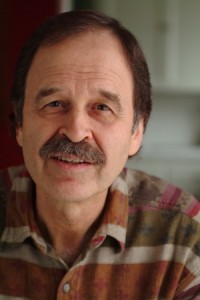
Allan Johnson is a writer and public speaker who has worked on issues of privilege, oppression and social inequality since receiving his Ph.D. in sociology from the University of Michigan in 1972. He began this work in the 1970s with a focus on men’s violence against women. He has written several nonfiction books, including The Gender Knot: Unraveling Our Patriarchal Legacy and Privilege, Power, and Difference. In February of this year, his first novel, The First Thing and the Last, was published. His full biography and a list of books and essays are available on his website at http://www.agjohnson.us/.
As blog editor for The Pixel Project, I had the pleasure of speaking with Mr. Johnson about his novel, a story of redemption and healing in the aftermath of domestic violence—one of the many forms of violence against women that The Pixel Project is working to end. Unflinching in its depiction of the reality of domestic violence, this portrayal presented challenges for the author in getting the novel published and, now that it’s in print, in making it known.
In this two-part post, Mr. Johnson answers our questions about The First Thing and the Last. (Mr. Johnson was also interviewed on NPR last summer. You can hear the interview here.)
————————————————————————————————————————————–
The violence was a major concern of publishers. Why did you choose to write the novel in this way, describing domestic violence in such an unflinching and graphic manner?
Because I felt called to write a story that told the reality of domestic violence. I don’t know how I could have done it any other way and still have told the truth. There were publishers who wanted me to make the novel easier to sell—“more commercial”—by “sugarcoating the violence,” pulling away at critical moments. But I couldn’t see the point. They were talking about a different book.
Publishers objected to the violence as “too real,” which I think means too close to home. The problem isn’t violence itself—the media are saturated with it after all. Consider the success of The Girl with the Dragon Tattoo. On top of that, depictions of violence make up only about 1% of the novel. I think what publishers found so unnerving is how normalized men’s violence against women is in this society and how profoundly disturbing is the violation of trust that is inherent in much of it.
What do you think are the pros and cons of your approach?
There is a real dilemma with such a story. If you tell the truth, people may get turned off, but if you don’t tell the truth, you just add more unreality to the state of denial we’re living in. I chose the side of reality in the belief that the story will find its audience through word of mouth.
I think I naively believed when I was writing the novel that if I could find a way to tell the story beautifully enough, people would want to read it in spite of what it’s about. I was wrong about that, but only to a degree. I’ve heard from many readers who didn’t think they could read it—including women with personal experience of domestic violence—but who then found themselves unable to put it down.
Since domestic violence is usually considered a “woman’s issue” (not that we agree with that viewpoint), how did you feel about taking it on as a man i.e. did you have any reservations about writing from an abused woman’s perspective or did you think that you might get some negative feedback because you are a man?
I’ve worked on these issues since the 1970s and had been living with them for a long time when this story came to me, so it never occurred to me that this was something I shouldn’t do simply because I’m a man. During the years it took to write the novel, I wasn’t writing it ‘as a man,’ but as a human being responding as humans do to suffering, as a writer and an artist drawing on my human capacity for empathy and imagination, doing what novelists do, telling stories about characters who are not us.
Where my gender did become a factor was in getting the novel published and then known. One senior editor at a major publisher suggested that concealing my gender might make it easier to sell.
People I meet at readings are often surprised—sometimes incredulous—that a man could write such a book. There are some who find it even presumptuous for a man to take on such a story told from a woman’s point of view. I understand that response given the political climate in this country and the reality of male privilege. But that doesn’t change what I felt I had to do as an artist and a writer, and I can only hope that people will judge the novel for what it is.
Look for Part Two of this post tomorrow, Saturday Oct. 23, when Allan Johnson will discuss the response to his novel from men and domestic violence survivors.
One thought on “Interview with Allan Johnson, Author of The First Thing and The Last”
Comments are closed.